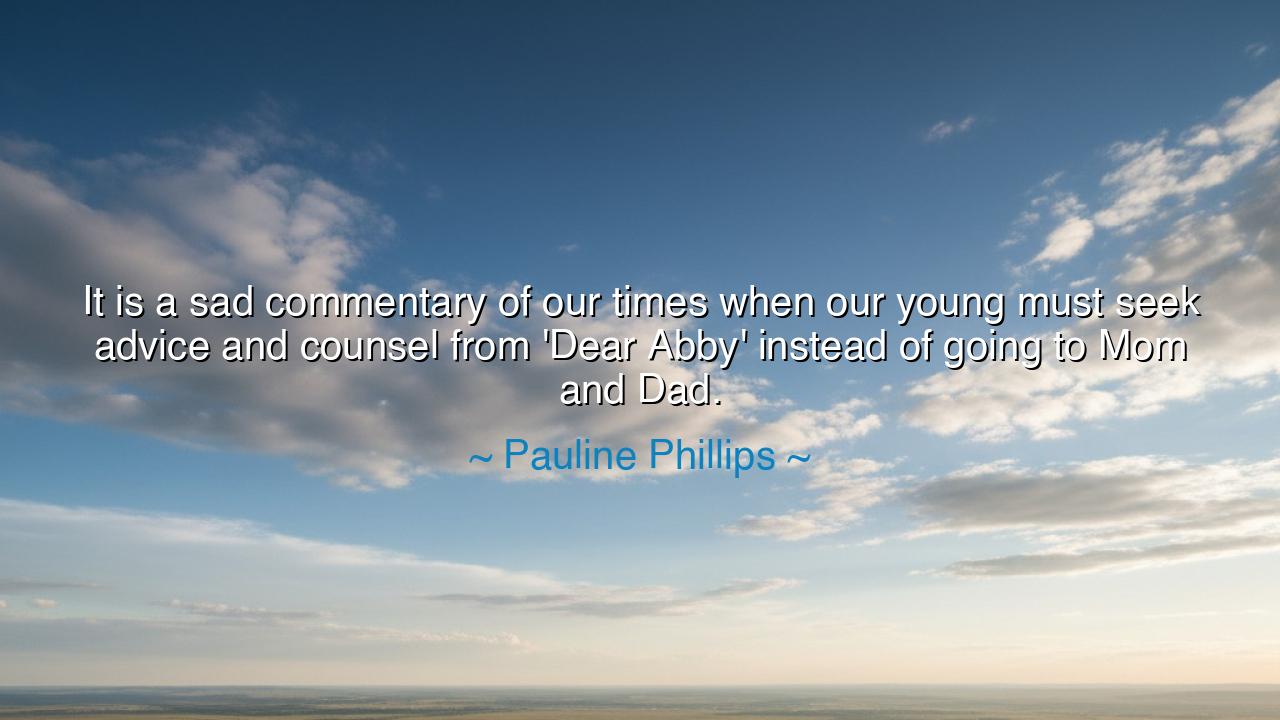
It is a sad commentary of our times when our young must seek
It is a sad commentary of our times when our young must seek advice and counsel from 'Dear Abby' instead of going to Mom and Dad.






When Pauline Phillips, the woman behind the famed advice column “Dear Abby,” wrote, “It is a sad commentary of our times when our young must seek advice and counsel from ‘Dear Abby’ instead of going to Mom and Dad,” she spoke not as the counselor to millions, but as a mother mourning the distance between generations. Her words pierce through the noise of modern life to reveal a timeless sorrow: that in the rush of progress and pride, the sacred bond between parent and child — once the wellspring of wisdom — has grown faint. Beneath her lament lies not cynicism, but love: a plea for families to reclaim the art of listening, of guiding, of being one another’s refuge.
The origin of this quote lies in the middle of the 20th century, during an age of cultural upheaval. The world had changed — wars had been fought, cities had swelled, and the rhythms of life had grown hurried. In this new era, young people found themselves surrounded by voices — radios, televisions, and printed words — yet often starved for understanding. Phillips, who under the name Abigail Van Buren became one of the most trusted advisers in America, saw letters pour in from the lonely and the lost. Teenagers wrote to her about love, fear, shame, and dreams — questions that, in gentler times, might have been whispered at the kitchen table. Her heart broke not because they wrote to her, but because they felt they could not speak at home.
In those few words — “a sad commentary of our times” — Phillips held a mirror to society. She was not condemning her readers; she was mourning what had been forgotten: that family is the first temple of wisdom, and that the counsel of a loving parent carries a power no column or stranger could replace. The advice-seeker might find comfort in print, but what they truly sought was the warmth of presence — the assurance that someone who knew them from birth still believed in them, even when they faltered. To her, the letters that came from the young were not merely words; they were cries across the widening gap between hearts.
This truth echoes through history. In the ancient world, wisdom was not found in books, but in people. Socrates walked the streets of Athens, guiding his students not with lectures, but with questions. In China, Confucius taught that the family was the root of virtue, that from filial respect flowed all harmony in the state. Yet in every age that grows proud of its progress, the same warning emerges: when parents cease to be teachers, and children cease to be listeners, the chain of wisdom that binds generations begins to fray. And when that chain breaks, society drifts — for what are nations but families writ large?
The modern tragedy, as Phillips saw it, was that technology and independence — though blessings in many ways — had taught the young to speak outward before speaking inward. They shared their secrets with strangers, their fears with friends, their questions with public voices, but rarely with the ones who loved them first. The home, once the hearth of counsel, had grown silent. Parents, overwhelmed or distracted, had lost their place as guides; children, uncertain or afraid, had lost their trust in the wisdom of those who came before. Thus, Phillips — the great advisor herself — confessed her sorrow: that the need for “Dear Abby” existed because the ancient bond of family had been neglected.
But her words, though mournful, carry also a message of hope and renewal. For if the bond can be broken, it can also be mended. The path back begins with humility — with parents who listen before they lecture, and with children who seek not perfection but compassion in those who raised them. To restore the family as the source of counsel is to rebuild the foundation of community itself. When love is spoken across the generations, when advice flows once more from parent to child and back again, the noise of the world loses its hold. The heart learns again where home truly is.
So, my child, remember this teaching: wisdom begins at the hearth. Do not seek far what may be found near. Speak to your parents, your elders, your kin; ask their stories before you ask the world’s opinions. And if you are a parent, open your heart — be not the judge, but the guide. For advice that comes from love lasts longer than advice that comes from letters. Let no generation be a stranger to the one before it. For as Pauline Phillips knew well, the truest counsel is not written in a column, but spoken softly across a table, where hands touch and understanding needs no signature — only love.






AAdministratorAdministrator
Welcome, honored guests. Please leave a comment, we will respond soon